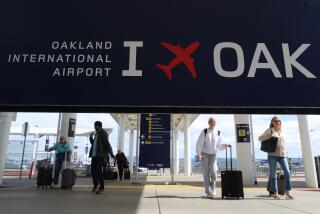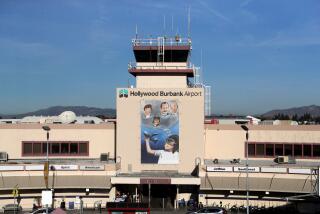Burbank Airport Concerns Bringing 3 Cities Together
After years of squabbling, political leaders from the three cities that run Burbank Airport will meet face to face in a bid to jump-start stalled negotiations over a new terminal, officials said Friday.
The city councils of Burbank, Glendale and Pasadena tentatively scheduled a summit for July 12 in Burbank, marking the first time in five years the three panels will have come together to discuss airport matters.
âThe time is right,â said Glendale Mayor Gus Gomez. âThe climate has changed in all three cities and thereâs greater attention on the airport, not just in Burbank and Glendale but in Pasadena, where they are taking a much more hands-on approach than in the past.â
Improved relations among local officials follows recent city council elections in all three cities and a move by Burbank to replace two longtime representatives to the nine-member Burbank-Glendale-Pasadena Airport Authority.
An agenda has not been set, but participants said they expect to confront Burbankâs demands for a mandatory overnight curfew and limits on airport growth. But some argue that the issue is far more complicated than reaching a consensus among the affected cities.
âThe city and the airport have virtually agreed on the size and the number of gates for the terminal,â said Burbank Airport Executive Director Dios Marrero. âThe real sticking points are can noise and operating restrictions be achieved? Thatâs something neither Burbank, Glendale, Pasadena nor the airport can control.â
Any final decision on growth limits or curfews rests with the Federal Aviation Administration. The airport authority is conducting an extensive review of the costs and benefits of restricting flights in and out of Burbank to curb noise and pollution.
While acknowledging that the FAA is the final authority on a curfew, Gomez said it is important for the cities to show a âunified front to the FAAâ and that âitâs not just a Burbank issue but a regional issue.â
Burbank consistently opposed plans for a new terminal over concerns the project would result in more jet noise and ground traffic. The position led to finger-pointing and lawsuits between the city and the airport authority. In 1999, the two sides compromised with a proposed ban on easterly takeoffs and a curfew to shut the passenger terminal between 11 p.m. and 6 a.m. Talks broke down months later amid fierce opposition from the airlines, Los Angeles and Burbank residents, and the FAA.
Facing a deadline, Burbank Airport put 81 acres of the Lockheed Martin site up for sale in March and hired consultants to evaluate a 41-acre parcel on the southwest side of the airport for a 14-gate, 250,000-square-foot terminal.
Airport officials insist a new terminal is needed to accommodate more travelers and to ease crushing growth that is expected to overwhelm regional airports.
About 4.7 million passengers use Burbank Airport each year. Growth projections vary, with some airport consultants saying traffic will double to 9.4 million passengers in 25 years and others predicting 7.2 million passengers by 2015, which would represent a 53% increase over last year.
A group of Burbank residents called Restore Our Airport Rights claims that the new terminal will amount to an airport expansion, leading to more flights and noise.
The group qualified a ballot measure for a special mail-in election Oct. 9 that would bar the Burbank City Council from approving âthe construction, expansion or financing of an airport facilityâ unless certain conditions are met.
The restrictions include a ban on all nonemergency air traffic from 10 p.m. to 7 a.m., caps on the number of flights and passengers, and public approval by a two-thirds vote before a new terminal could be built.
Howard Rothenbach, ROARâs founder, said Friday he was skeptical that the citiesâ upcoming meeting would change anything.
âOur biggest concern is that they are not going to involve the people . . . that the people wonât have a place at the table,â he said.
More to Read
Sign up for Essential California
The most important California stories and recommendations in your inbox every morning.
You may occasionally receive promotional content from the Los Angeles Times.










